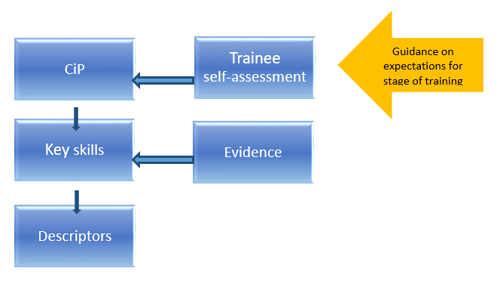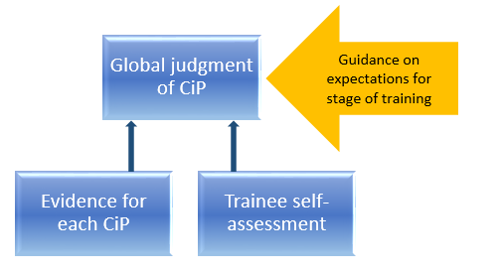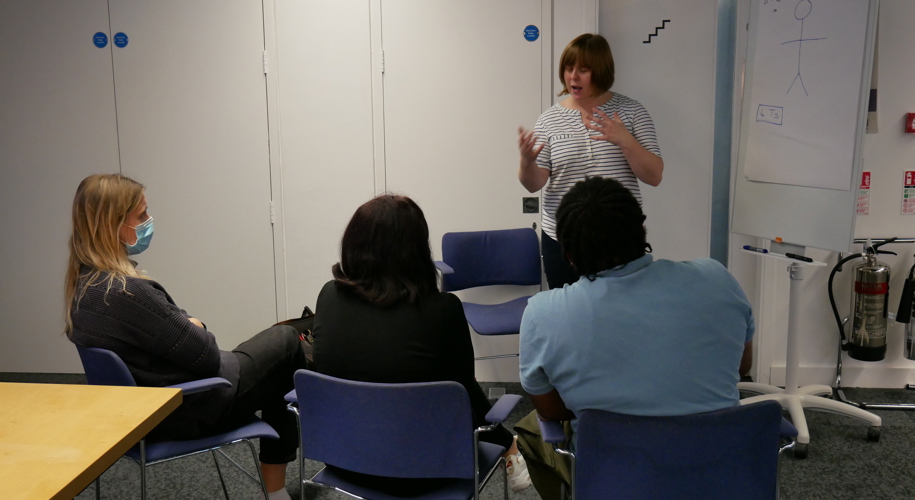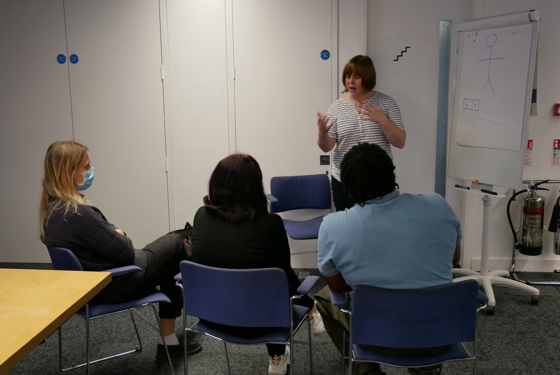Programme of assessment
Purpose of assessment
The purpose of the programme of assessment is to:
- Assess trainees’ actual performance in the workplace.
- Encourage the development of the trainee as an adult responsible for their own learning.
- Enhance learning by providing formative assessment, enabling trainees to receive immediate feedback, understand their own performance and identify areas for development.
- Drive learning and enhance the training process by making it clear what is required of trainees and motivating them to ensure they receive suitable training and experience.
- Demonstrate trainees have acquired the GPCs and meet the requirements of good medical practice.
- Ensure that trainees possess the essential underlying knowledge required for their specialty.
- Provide robust, summative evidence that trainees are meeting the curriculum standards during the training programme.
- Inform the ARCP, identifying any requirements for targeted or additional training where necessary and facilitating decisions regarding progression through the training programme.
- Identify trainees who should be advised to consider changes of career direction.
Programme of assessment
Our programme of assessment refers to the integrated framework of exams, assessments in the workplace and judgements made about a learner during their approved programme of training. The purpose of the programme of assessment is to clearly communicate the expected levels of performance and ensure these are met on an annual basis and at other critical progression points, and to demonstrate satisfactory completion of training as required by the curriculum.
The programme of assessment comprises the use of a number of individual assessment tools. These include the MRCOG examination, and summative and formative workplace-based assessments. A range of assessments is needed to generate the necessary evidence required for global judgements to be made about satisfactory performance, progression in, and completion of, training. All assessments, including those conducted in the workplace, are linked to the relevant learning outcomes stated in the core curriculum.
The programme of assessment emphasises the importance of professional judgment in making sure learners have met the learning outcomes and expected levels of performance set out in the approved curriculum. It also focuses on the learner as a reflective practitioner. Assessors will make accountable, professional judgements on whether progress has been made according to a learner’s self-assessment. The programme of assessment explains how professional judgements are used and collated to support decisions on progression and satisfactory completion of training.
Assessments will be supported by structured feedback for trainees. Assessment tools, which are well established in O&G training, will be both formative and summative and have been selected on the basis of their fitness for purpose and their familiarity to trainees and trainers.
Trainees will be assessed throughout the training programme, allowing them to continually gather evidence of learning and to provide formative feedback. Those assessment tools which are not identified individually as summative will contribute to summative judgements about a trainee’s progress as part of the programme of assessment. The number and range of these will ensure a reliable assessment of the training relevant to their stage of training and achieve coverage of the curriculum.
Reflection and feedback should be an integral component to all workplace-based assessments. Every clinical encounter can provide a unique opportunity for reflection and feedback and this process should occur frequently – and as soon as possible after any event to maximise benefit for the trainee. Feedback should be of high quality and should include an action plan for future development for the trainee. Both trainees and trainers should recognise and respect cultural differences when giving and receiving feedback. RCOG assessment tools have been revised to include reflection.
Assessment of CiPs
The CiP is the fundamental basis of global judgement. Assessment of CiPs involves looking across a range of key skills and evidence to make a judgement about a trainee’s suitability to take on particular responsibilities or tasks as appropriate to their stage of training. It also involves the trainee providing self-assessment of their performance for that stage of training.
Clinical Supervisors and others contributing to assessment will provide formative feedback to the trainee on their performance throughout the training year. Evidence to support the global rating for the CiP will be derived from workplace-based assessments and other evidence, e.g. TO2.
The global judgement process
Towards the end of the training year, trainees will assess their own progression for each CiP (Figure 2) and record this in the ePortfolio, signposting to the evidence that supports their rating. The Educational Supervisor will review the evidence in the ePortfolio including workplace-based assessments, the TO2 and the trainee’s self-assessment and record their global judgement of the trainee’s performance in the Educational Supervisor Report (ESR), with commentary. Figure 3 shows how the trainee’s self-assessment and the evidence feed into the global judgement by the Educational Supervisor.

Figure 2 - Trainee self-assessment of a CiP

Figure 3 – Educational Supervisor’s assessment of all CiPs
Each CiP will be globally judged against the expectations for the particular stage of training. However, there will be a difference between the global judgement of generic and non-clinical specialty CiPs, and clinical specialty CiPs. This is because of the need to allow the Educational Supervisor to make a decision about how much supervision a trainee requires before they reach the designated level of supervision for a particular CiP.
Generic and non-clinical specialty CiPs
The trainee will make a self-assessment to consider whether they meet expectations for the stage of training, highlighting the evidence in the ePortfolio. The Educational Supervisor will indicate whether the trainee is meeting expectations or not using an anchor statement, as in the template below. Trainees will need to meet expectations for the stage of training as a minimum to be judged satisfactory to progress. The expectations for each stage of training for generic and non-clinical CiPs will be specified in the CiP guidance on RCOG eLearning.
Global judgement to be used for generic and non-clinical specialty CiP
Trainee self-assessment
FOR EACH CiP
Statement of whether performance is considered by trainee to be:
- Not meeting expectations for this year of training; may not meet the requirements for critical progression point
- Meeting expectations for this year of training; expected to progress to next stage of training
Link to key skills evidence on ePortfolio.
Educational Supervisors assessment
I agree with the trainee’s self-assessment of this CiP.
I do not agree with the trainee’s self-assessment for the following reasons:
Educational Supervisors global judgement for all generic and non-clinical specialty CiPs
Based on the trainee’s self-assessment and the evidence provided, I therefore consider that the trainee’s performance is:
- Not meeting expectations for this year of training; may not meet the requirements for critical progression point
- Meeting expectations for this year of training; expected to progress to next stage of training
Clinical specialty CiPs
The trainee will make a self-assessment to consider whether they meet expectations for the year of training, using the five supervision levels listed in Table 3 and highlighting the evidence in the ePortfolio. The Educational Supervisor will indicate whether the trainee is meeting expectations or not by assigning one of the five supervision levels, as in the template below. Trainees will need to meet expectations for the year of training as a minimum to be judged satisfactory to progress. The expectations for each year of training for clinical specialty CiPs will be specified in the CiP guidance on RCOG eLearning .
Table 3 shows the five supervision levels that are based on an entrustability scale which is a behaviourally anchored ordinal scale based on progression to competence and reflects judgments that have clinical meaning for assessors[1] .
Table 3 – Levels of supervision
|
Level |
Descriptor |
|
Level 1 |
Entrusted to observe |
|
Level 2 |
Entrusted to act under direct supervision: (within sight of the supervisor). |
|
Level 3
|
Entrusted to act under indirect supervision: (supervisor immediately available on site if needed to provide direct supervision) |
|
Level 4 |
Entrusted to act independently with support (supervisor not required to be immediately available on site, but there is provision for advice or to attend if required) |
|
Level 5 |
Entrusted to act independently |
Global judgement to be used for clinical specialty CiP
Trainee self-assessment
FOR EACH CiP
Statement of what level of supervision is required.
Link to evidence on the ePortfolio.
Educational Supervisors assessment
I agree with the trainee’s self-assessment and have added my comments to each CiP.
I do not agree with the trainee’s self-assessment for the following reasons:
Educational Supervisors global judgement of the clinical CiPs
I consider that the trainee’s performance overall meets the clinical entrustability scale of 1-5 (specify) and that the trainee is:
- Not meeting expectations for this year of training; may not meet the requirements for critical progression point
- Meeting expectations for this year of training; expected to progress to next stage of training
[1] Entrustability Scales: Outlining Their Usefulness for Competency-Based Clinical Assessment


